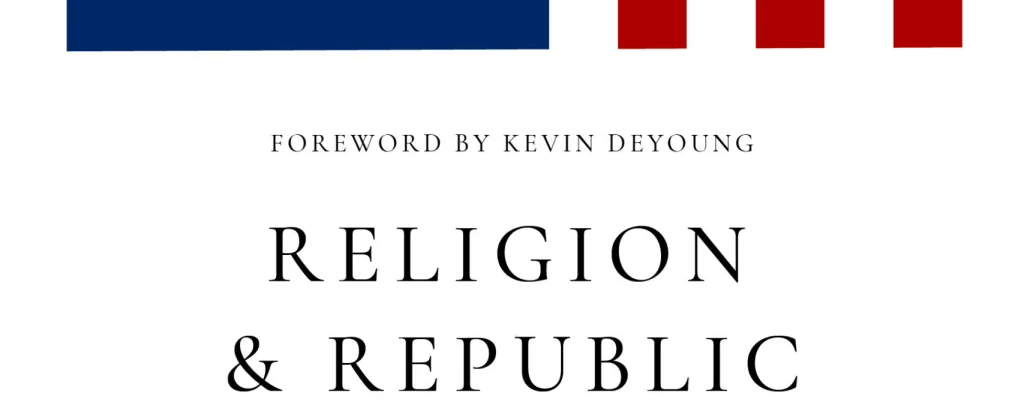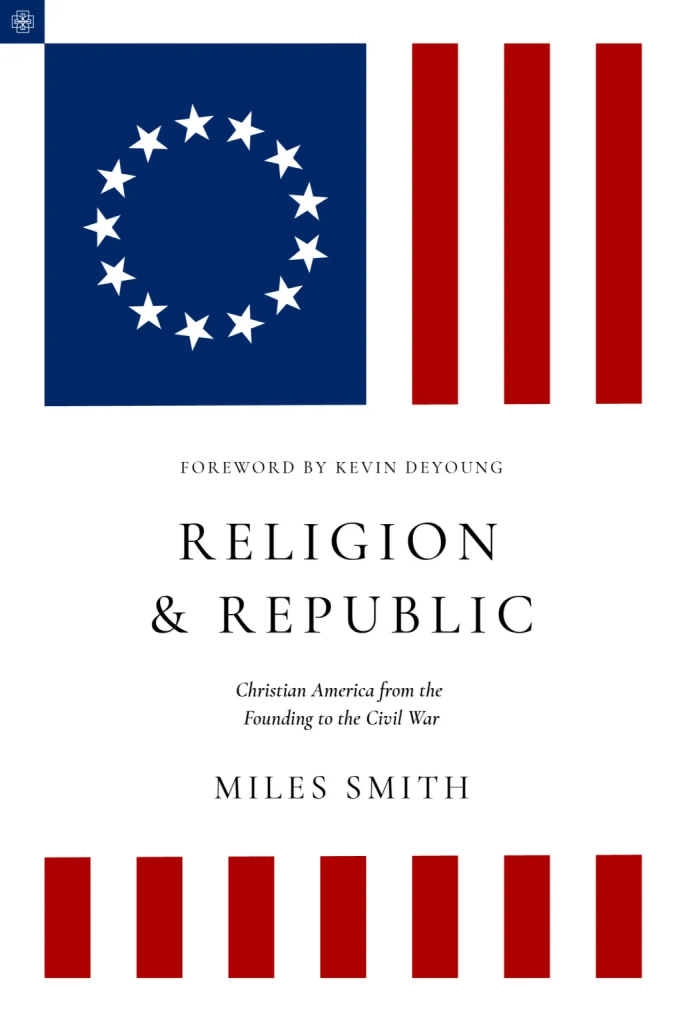

Congratulations to Miles Smith on the publication of his book, Religion and Republic: Christian America from the Founding to the Civil War (Davenant Press, 2024)! We are grateful that Miles took the time to answer some questions about the book from Dan Williams.
Dan Williams: This is a book about church-state relations in the early republic. What do you argue in this book? What parts of your argument do you think would surprise readers who may have read at least one or two other books in the past on this topic?
Miles Smith: At the risk of putting on my Anglican hat in a publication that’s geared towards evangelicals, I’d offer that my book is not actually about church and state.
The assumption that the church is the only religious institution is a common one, particularly given the tendency towards clericalism in evangelical type churches—meaning, the idea of pastors or churches speaking on every possible issue. My argument, rather, is that the Early Republic saw religion or faith—not “churches” per se—as having ”a necessary and salutary effect on law, politics, and society that deserved to be preserved and perpetuated by the civil magistrate. This did not preclude a belief in religious liberty.” Few if any major Protestant politicians or intellectuals wanted any sort of state churches, but they simultaneously thought that children, for example, should probably learn about the Bible as a part of state funded moral formation.
DW: You argue that the early American republic was “liberal” but not “secular.” What do you mean by that—and how would you explain the difference between the two concepts for people who may not be sure what the distinction is? In what way did church disestablishment in early America coexist with a strong support for public Christianity and Christian-infused public institutions?
MS: Historically an institution that was secular was generally understood to be an institution that was not churchly. So, for example, secular education was education that was not done by the Church.
Early Republic Protestants had a more limited understanding of what the church was and did than moderns do, largely because not that many people went to church. They had a pretty clear picture of what was churchly and what was not. And that was particularly important for groups like Baptists, who had a history of being persecuted for specific beliefs about what the church was. They did not, however, think that a secular institution needed to be an irreligious institution.
Take the example of public schools in Northern states. These schools were undeniably secular. They were not run by churches. They were run by states. And yet the same schools were completely committed to public affirmation of Christian, and generally more specifically protestant understandings of religion, society, education, culture, etc.
The McGuffey primer that became so famous in early Republic’s schools has as one of its first lessons the famous statement: “in Adam’s fall, we sinned all.” Undoubtedly these early public schools were not churchly, but children were learning Christian, moral and social precepts nonetheless.
DW: You argue that Thomas Jefferson’s views on church-state separation were not representative of American views in the early republic, and that his views stemmed from an antipathy to Christianity. What were some of the key differences between Jefferson’s views and those of many other Americans at the time, including many of the founders? And why did Jefferson’s views receive strong support from Baptists and a few other evangelicals if Jefferson was hostile to organized religion?
MS: A good place to start is the difference between Jefferson and Washington.
It is common to note that Washington did not take communion, and his relationship with religion has been litigated too many times to count. But on the question of religion and the state, he affirmed the long-time understanding among Protestants and Anglicans that church and state both played a role in upholding civil society, and that they could cooperate in doing so.
The extreme disestablishmentarianism of Jefferson and Madison—churches weren’t able to incorporate again in Virginia until the beginning of the twenty-first century—“did not exhaust the range of the Founders’ thinking about matters of church and state, and their views were far more narrow than Washington’s.”
So, the views of Jefferson and Madison did not represent the majority opinion among the Founding Fathers. Jefferson, put simply, loathed the church as an institution. The extent to which Jefferson disliked churchly or creedal Christianity was already well-known in 1800. After his presidency Jefferson wrote more candidly about his own beliefs, but even his actions during his political career indicate a relatively enduring dislike of doctrines such as the Trinity. Jefferson’s deism—which appeared to have solidified into Unitarianism as he grew older—rejected the Trinity vehemently. He viewed the doctrine as the source of religious intolerance. The belief that God was one person, and that Christ was not divine had been, he argued, the belief of the primitive Christian Church. The “unity of the supreme being” was not, he raged, “ousted from the Christian creed by the force of reason, but by the sword of civil government wielded at the will of the fanatic Athanasius.” Jefferson called the Athanasian Creed a “hocus-pocus phantasm of a god like another Cerberus, with one body and three heads” which “had its birth and growth in the blood of thousands and thousands of martyrs.”
The strongest proof of what Jefferson called the “the solidity of the primitive faith” was its restoration “as soon as a nation arises which vindicates to itself the freedom of religious opinion, and it’s eternal divorce from the civil authority.”
For Jefferson, the American religious settlement was not simply a soil in which Unitarianism was permitted to grow, but itself the fruit which proved the truth of Unitarianism. Disestablishment’s naturally corollary was the growth of Unitarianism and a rejection of the Christian Trinity. This was hardly a view shared by his enthusiastic Baptist and Presbyterian supporters, but they eventually learned the third president held it deeply, much to their surprise and chagrin—particularly when Jefferson began picking potential faculty members for the University of Virginia.
Figures like John Jay or Roger Sherman did not share the separationist and anti-churchly views of Jefferson, even as they were a devout Anglican and a Presbyterian who diverged to some degree on the extent of disestablishment.
DW: The argument that David Sehat presented in The Myth of American Religious Freedom (OUP, 2011) seems to agree with your assessment that there was a much closer relationship between church and state in early 19th-century America than there was in the late 20th century, but it argues that this close relationship between church and state was detrimental for religious minorities—and that a firm wall between church and state is necessary to secure religious tolerance in a pluralistic society.
How would you respond to this argument? Was the early 19th-century American Protestant republic a comfortable place for religious minorities, including Jews, Catholics, Mormons, skeptics, and members of various new religious sects that were outside the mainstream?
MS: The Founders were explicit about the potential inclusion of Jews, Roman Catholics, and even Muslims in their conception of who could have religious liberty in the new American republic. The question of Mormons is different, because their persecution was at times coded as religious by media but always prosecuted as criminal or unnatural. As societies in the 19th century went, the United States was quite tolerant. It is hard to find any legal persecution of groups coming out of the Second Great Awakening outside the LDS movement, and prominent freethinkers lived quite freely even if Americans did not tend to vote for them in political office.
It’s worth noting that Mormons, Roman Catholics, and freethinkers did eventually find relative cultural and social acceptance. Their successive inclusion nonetheless rested on the Anglo-Protestant foundation of civil liberty. Tocqueville stated flatly that “Americans combine the notions of Christianity and of liberty so intimately in their minds, that it is impossible to make them conceive the one without the other.”
The nineteenth-century United States’ religious order would never be anything less than Protestant, but it would understandably also eventually be more than Protestant.
DW: How long did the United States remain a “Protestant republic” or “Christian nation” in the way that it was in the early 19th century? At what point did the institutions and frameworks that formed the basis for the “Protestant republic” collapse—and what caused their demise?
MS: A chief culprit was the replacement of Christian institutionalism with a sort of syncretic religious nationalism that, I think, might be better called Christo-Americanism.
Between 1865 and 1900 there was an increasing tendency to identify the United States with the church. You can look at a speech called “The March of the Flag” from the 1890s by a Republic US Senator from Indiana—Albert Beveridge—that essentially argued that the United States was not merely a chosen nation, but that it fulfilled functions Early Republic Protestants—even ones who wanted a Christian culture—would have believed were churchly prerogatives.
Beveridge argued that “God’s great purposes” for the United States were “made manifest in the instincts of our race, whose present phase is our personal profit, but whose far-off end is the redemption of the world and the Christianization of mankind.” Beveridge would also tell Americans they were “God’s chosen people.”
Theological liberals, in particular, believed that social reform on an imperial scale was the job of American religion and American politics. The two increasingly became one. Liberal democracy and American style freedoms became synonymous with Christianity. Beveridge tied this together rather explicitly. “Liberty and Civilization and God’s promise” were the gifts America was to bring to the world. That’s a very different proposition than the Early Republic’s more modest understanding of the mission of the church.
DW: Would you like readers to use your book as a guide to restoring a “Christian nation” or as an argument against secular interpretations of early American history? Or did you have a different goal in mind in writing this book? What would you like readers to gain from your book and how do you think they might be able to profitably use this information?
MS: Most fundamentally, I’d like Christians to understand how seriously their forebearers took institutions.
In our own time the tendency among, at least, conservative evangelicals is to try and Christianize society through national elections. This is a narrow and often ideologically driven understanding of Christianity’s relationship to the social and political order and to institutions.
I say at the end of the book that modern Protestants would do well to understand that they can’t dial back the clock to the Early Republic. But they can engage their neighbors by being healthy and responsible stewards of healthy and responsible Christian institutions at the local, municipal, and state levels, and in the arts, education, the sciences, as well as in politics—because this is what America’s character as a Christian nation has always meant.
Too often evangelicals in the twentieth century prioritized the autonomous individual or an idealized nation, with no thought whatsoever for the life of intermediate institutions—civil, political, and religious—that sustain human civilization. In order to protect Christianity, evangelical Protestants in the twenty-first century can start by taking institutions seriously. They don’t have to start with a historical tabula rasa. Protestants in the Early Republic believed in the importance of maintaining Christianity in civil and social institutions. For that reason alone, they deserve our attention, if not our respect.